Dr. Phil KamibayashiyamaDr. K is the director of BJMBC, teaching theology, preaching and church history. The Sexual Revolution, Gay Marriage, Theological Liberalism, The Humanist Manifesto, Postmodernism, Atheism. What is foundational to these views? Evolution!!! To reach today's world, often we must start at the beginning: the Genesis record. If creation and the flood are false, what else in the Bible is false? But science does not contradict the Bible. True science supports the Bible. Learn how to defend your faith with science and use creation apologetics to lead unbelievers to faith in the gospel of Jesus Christ. Skip Tilton is the founder of From Day One Ministries and supervised the construction of Answers in Genesis' Creation Museum under Ken Ham. He is a creation evangelist who has spoken throughout the USA in conferences, retreats, camps, churches, Christian academies, public schools, and universities. He is also an adjunct speaker for Creation Ministries International. Monday's "Biblical Worldview Seminar" is for spiritually-minded teens and adults (pastors, Christian workers, church leaders, evangelists, SS teachers, Christian school teachers & administrators, and gospel witnesses).
Tuesday's "Dinosaurs & the Bible" seminar is primarily for high school teens (9th - 12th grade) but intermediate students and college students can attend. Both seminars use many interesting and enlightening pictures. Each seminar starts at 9 am and has a registration fee of P150 (P100 for lunch and P50 for the seminar). P150 registration deadline is Thursday January 26. After January 26, you may only register for the seminar (P50). Educators who attend both seminars can avail of a free certificate of attendance to apply for continuing professional education units.
1 Comment
Thoughts from Dr. Phil Kamibayashiyama, Director of BJMBC.
Theologians and philosophers sometimes talk about the problem of evil—if God is good and has all power, why does evil still exist? It’s a hard problem. But for most of us the question is much more basic. When I hurt, does God know? Does He care? Why won’t He take away my sorrow? There are three basic truths we need to remember in such times. We don’t know half of what God is doing. In the middle of trials we often find ourselves asking “why?” If we knew of something good that came from out of it, we could make some sense of what happened. Even unbelievers use clichés like “everything happens for a reason” out of a desire to find purpose in the pain. But the most painful struggles aren’t easily dismissed for just that reason—there are no simple, happy outcomes. Sometimes an obvious greater good never presents itself to us at all; our suffering seems completely unnecessary and gratuitous. Rather than search in vain for a reason beyond this, we should know that more is going on than we can possibly comprehend. Scripture has occasional hints of this fact. One window into the workings of heaven is absolutely startling. It’s an angelic conference before the throne of God and Satan is in attendance (Job 1-2). The story develops into a showdown between Satan and God as to whether Job really loves God or simply returns the favor for prosperity. In the end, Satan destroys Job’s life in an attempt to shame the Almighty (though he can go exactly no further than God allows). After Job struggles for an unknown length of time, God eventually restores and even increases His prosperity. But interestingly, there’s no sign that Job himself ever knew of the heavenly contest. Job may well have finished his life never realizing what was at stake or why he suffered as he did. I would never flatter myself to assume my life ranks in debates before the throne of God. But Job wouldn’t have either. There is, we discover, far more at stake in the lives of believers than any of us would dare imagine. And before thinking that God has fallen asleep at the cosmic wheel or that He simply doesn’t care, we ought to know that He works on our behalf in ways we cannot comprehend. A simple comparison might help. At 1 1/2, my daughter is terribly frustrated that I won't let her run in the middle of a busy street at rush hour. Add to that the fact that I make her eat healthy food, put her to bed at a reasonable hour, don’t buy her every toy she wants, and require her to obey me. These are the biggest frustrations and limitations of my daughter’s life, but every one contributes directly to her long term well-being. Except she doesn't get that fact at all. My child still doesn’t understand why I won’t let her run in traffic. It’ll be a long time before she does. How many other things do I constantly take care of that never even enter into her mind? And I wouldn’t want it any other way—why should she carry the burden of knowing that life involves more than cookies, toys and her blanket? In the meantime, she has no choice but to simply trust what she does know of me—my love to her expressed in other ways and the fact that I regularly act in her best interests. Facing the limitations I’ve imposed on her, this can’t solve her problem, but it certainly helps. God Himself has entered our sorrow. In a certain sense, every religion or viewpoint must answer why evil exists.* In fact, the problem of evil is not a particular weakness of Christianity but one of its unique strengths, because only Christianity teaches that an omnipotent God has Himself endured our suffering (Heb. 2:9). Jesus experienced the ordeal of birth, the frustrations of childhood and uncertainties of adolescence, the drudgery of physical work and constant pain of life on a fallen planet. But Jesus’ suffering was not merely equal to ours. What Jesus carried on the cross was the distilled essence of sin’s horror, agony and curse. Sin is sorrow. Carrying the weight of the sins of the world, Jesus also carried its sorrow. His dying cry, “my God, my God, why have you forsaken me?” (Matt. 27:46) distills the agony of humanity across the ages. In that moment, Jesus experienced what it is to be condemned, guilty, cut off from God and consigned to torment. If sorrow is the galling experience of mankind because of sin, God Himself has shared it. And so we face the pain of life on planet earth, but not alone. Joining in the experience of that sorrow is One who bore all the consequences, though He never sinned. Knowing that all will be restored through Jesus’ cross, we wait together with Him for the final victory over sin, suffering and death. We await the final victory over all. In the final analysis, there are no simple, pat answers for the problem of evil. The ultimate answer is epochal and cosmic—as big as the history of the world. If suffering entered the world because of sin (Rom. 5:12), only by the eradication of sin will all things be restored. In other words, the omnipotent God is in the process of working. He is restoring all things as they ought to be. (Isa. 65:17–18; Isa. 66:22–23; 2 Pet. 3:10–13; Rev. 21:1). The problem of evil, though real, is a temporary one. The victory is coming—the great and final victory of Jesus Christ over all. * Even atheism must answer how we can legitimately designate anything as evil. Without a standard of ethics, the problem of evil simply becomes why anyone should care about human suffering. In fact the logical conclusion of atheism is far worse—evil and human suffering are utterly meaningless or even good because they are just the struggles of biological machines experiencing natural selection.
The Explicit Command in 2 Timothy 2:2 In this passage, Paul directly orders his former student to ensure the continuity of sound doctrine by entrusting it to faithful men who can also teach. Paul states, “And the things that thou hast heard of me among many witnesses, the same commit thou to faithful men, who shall be able to teach others also.” During this time, Timothy was apparently leading the Ephesian church under Paul’s directive (1 Tim. 1:3). The passage shows a clear example of a departing leader giving orders to a younger leader he himself had instructed, telling him to arm other (presumably younger) men in propagating the truth. Timothy must prepare these faithful and gifted men by entrusting them with “the things that he has heard [from Paul] among many witnesses.” Just as Paul felt compelled to prepare men like Timothy to carry on the gospel ministry, so he now requires Timothy to do the same. It is then a pastoral obligation to entrust the Word of God to the rising generation of faithful men. Two Pastoral Responsibilities Equipping every believer Ephesians 4:11 indicates that the Lord Jesus gave to His church certain spiritually-gifted individuals. They are apostles, prophets, evangelists, pastors, and teachers (though the latter two can also be rendered as one role, “pastors/teachers”). The following verse states the reason for Christ’s bestowal of gifted believers to His body. They were given “for the perfecting of the saints for the work of the ministry” in order to fulfill the ultimate purpose of “edifying the body of Christ,” the church. Perfecting (καταρτισμὸν) means “equipping.” Thus, along with other gifted men, the pastor bears the responsibility of preparing each of the church members that God has sovereignly placed under his care for Christian service (“work of the ministry”). This ministry scope also includes the ministerial students in the congregation, and the pastor is one of the primary men who are responsible in preparing future pastors for the work of the ministry. Like the pastor, ministerial students will soon be responsible in equipping other believers for service. This reality must motivate current ministers all the more to equip these future equippers. Overseeing God’s flock Pastors are the designated overseers of the believers in a local church. Speaking to the Ephesian elders or pastors, Paul states that the Holy Spirit has made them the “overseers” (ἐπισκόπος) of God’s flock (Acts 20:28). This designation communicates the pastoral responsibility of watching over or supervising the believers in the church. The scope of the responsibility seems to focus on the church as a group (“flock”). But practically speaking, fulfilling the command implies watching over the individual members of the body. As one cannot adequately take care of his whole body without giving attention to the well-being of each part of it, so the pastor cannot completely fulfill the mandate of being an overseer without paying attention to individual members of his congregation. He cannot be an accomplished overseer without overseeing the preparation of those who would be future overseers themselves. Since pastors must watch over the believers who are under their care, expecting them to mentor the ministerial students in their congregation does not really constitute an unreasonable, above-the-norm expectation. Welcome to the BJMBC Biblical Baptist, a twice-a-month blog from Bob Jones Memorial Bible College. We pray that these truths that God is using in our lives will help others to grow in their walk and service for God.
This first article is unusual because we just experienced the home-going of one of BJMBC’s founding fathers, Pastor Dennis Potts. The Lord commands us in Hebrews 13:7 to remember our leaders who spoke the word of God to us, to consider the outcome of their way of life, and to imitate their faith. God knows that we quickly forget those we no longer see, even our leaders. By forgetting and not considering their life example, we neglect a pattern that God intends to help us – a pattern that we have seen with our own eyes and of how the faith should be lived in this world. Remembering will help us to glorify our Father in heaven. Since a person’s character and ways make him especially useful to God, I will focus on those personal details which displayed Pastor Potts’ character and ways. The Lord uses someone with a passion to witness and see souls saved. Pastor Potts constantly grabbed opportunities to witness each day. What he loved the most was to seek souls for Christ. His favorite song for BJMBC’s Preachers Forum class was “Souls for Jesus.” Even after multiple system atrophy slurred his speech, affected his balance, and weakened his legs, he used his remaining strength to go out, meet people, have extended conversations, and talk about Jesus. The root of his passion for souls and witnessing was his passion for Christ and His cross. No one took the Lord’s supper more seriously and with greater sacred devotion than Pastor Potts. No wonder that his favorite song was “When I Survey the Wondrous Cross.” The Lord uses someone who also has strong biblical convictions. Pastor Potts preached hard against sin. He preached strong because he was convinced of the truth. According to the record in his Bible, he had read the Bible at least 33 times and the New Testament at least 40 times. Even more significantly, his Bible was marked on every page with underlines, many notes, lines connecting words, and sermon outline points. His convictions led him to speak out and take stands even when in the minority. For example, He strongly held to the qualification of purity for anyone going into the ministry. But he also loved to have fun, as long as it was holy fun. The Lord uses someone who is kind and compassionate. Pastor Potts preached loudly in public but never raised his voice in private. When needed, he would visit at midnight or rush to the emergency room. He was the accountability partner for struggling members and gave load credit when a member ran out of load to text him. When a member had board exams, he would call him each day and pray with him over the phone. He would meet men in the church for coffee and pour out his heart to them. To those who wrongly left the church, he was gracious and kind, following Christ’s example who said “Father, forgive them, for they know not what they do.” In discipline, he would try to package truth and mercy. But his genuine love also led him to do and say the difficult things, such as when a fellow-pastor needed rebuke. Lastly, the Lord uses someone who faithfully, dependently, and believingly prays. One morning I made a surprise visit to his house and found him on the floor face down in earnest prayer for his family, church, souls, and friends around the world. His well-worn prayer cards guided his extended time of daily prayer. After reading Mark 11:23, he said that if it were needed to advance Christ’s work, God could pick up Taal volcano, remove it from Lake Taal, and cast it into the Pacific Ocean in answer to his prayer. He now sees what he believed. His ears hear the heavenly voices praising the eternal King, his voice is joining with them, and his knees are once again strong to bend before the Lamb. Our lives will pass as quickly as his did. Let us see ourselves as lives in Christ and make choices for Him. by Dr. Phil Kamibayashiyama Times have changed, even within Christianity. Just look at what is produced by today’s Christian publishers and media, the standards and lifestyle of Christians, and even the way Christians worship in churches. The Bible teaches that some changes are bad and some are good. We are called to discern the difference by God’s Word. II Timothy is Paul’s last words to the next generation—Timothy. Paul told him that times would change for the worse, and Paul exhorted him what to do—how to keep firm in the faith in changing times. Paul has 3 main themes here: 1) Suffering 2) Testifying of the Truth 3) Increasingly Evil Times. The main truth of 2 Timothy is this: Although you suffer for it, testify of the words of truth during this increasingly evil age. Our Gospel Sufferings: Paul exhorts Timothy in 1: 8: “Be not thou therefore ashamed of the testimony of our Lord, nor of me his prisoner: but be thou partaker of the afflictions of the gospel according to the power of God.” First, be not ashamed to testify about the Lord. Second, be partaker of the afflictions of the gospel. There is suffering for testifying about the Lord, but do not be ashamed of Him! Speak about the Lord! Stand with His people! Join in suffering for the truth! 1:12a: “For the which cause [vv. 8-11: speaking the gospel] I also suffer these things: nevertheless I am not ashamed.” Vv. 15-16 mention 2 sufferings: V. 15: All other believers turned away from Paul. Why? V. 16: They were ashamed of “his chain.” But 2:3 commands “Endure hardness/hardships.” 2:10 tells us to endure all kinds of hardships because the salvation of souls is stake! Our Mission: to Testify the Words of Truth. Secondly, we endure gospel sufferings because they are part of fulfilling our mission. Our mission starts with holding the truth. 1:13: Hold fast the form of sound words. V. 14 calls the truth “that good thing which was committed unto thee.” What are we commanded to do with that truth? Keep it! Do not change because of trends. Do not yield to worldly influences. Then we are to testify of the truth to others! 2:2: Teach it to faithful men. 2:14: Remind them of it. 2:25: Instruct those that oppose (themselves). Of course, to testify of God’s truth, you must study diligently the Word to accurately explain it. Do you study God’s Word? (Not only reading the Bible or studying Christian books.) To stand for truth, we must be convinced of it. To be convinced, we must study it! Then, to hold and testify of the truth, we must avoid unprofitable words (2:14, 16, 23). This refers to religious speculations and issues of curiosity. They have no profit! Instead, study what the Biblical text actually says! God also commands us to purge ourselves from bad influences (2:21) and to flee youthful lusts (2:22). Testifying of God’s truth involves your entire being: what is in your mind and heart, what is in your life, what is in your relationships. We must be pure. Do not be lukewarm! 1) Are you studying God’s Word? 2) Are you holding on to it? 3) Are you avoiding bad influences and unprofitable words that pull you away from the truth? 4) Are you telling God’s Word to others? Last question: Will you maintain a Bible-filled life and testify the truth even as the world gets worse? Our World: People will become worse. 3:1-5 pictures an increasingly anti-truth world. From such ungodly people, turn away! 3:8 says these people resist the truth. 3:13 says evil men and false teachers shall become worse and worse. BUT YOU, v. 14, continue thou in the truth you have learned even when there is more opposition to the truth and a life obedient to the truth. YOU maintain a Bible-filled life and testify of its truths. This is because the Scripture is from GOD and is profitable for every need of man. Chapter 4 says the Word is what we must preach, no matter what people do.
Someday, we will all stand before God. Each one of us will give an account of whether we were faithful to God and His truth in our generation. We must study the truth, stand for the truth, speak the truth, live the truth, and endure any suffering that comes with holding the truth. Will you do this? Although you suffer for it, testify of the words of truth during this increasingly evil age.  by Dr. Timothy Berrey I recently read Gerald Bray’s The Doctrine of God. Bray is an evangelical (in the Church of England), and we could not give him a full endorsement. His book, however, helpfully surveys the historical battles and issues in Theology Proper. Bray’s book reminded me how important terminology is in theology. A small misstep in statement can plunge a man over the abyss of heresy. Even in a well-meaning man, a faulty logical paradigm can reap unintended consequences. Origen (ca. 185-254 AD), for example, correctly held that the Father, Son, and Holy Spirit were three Persons (hypostases) of a single Being (ousia). His proposal, however, in which the Son and the Holy Spirit both had some kind of a beginning forced him to the position that only the Father was “God in Himself” (autotheos). Arian, the fourth century heretic, took Origen’s conclusion to its logical end when he concluded that the Son is similar in nature to the Father (homoiousios) but not the same (homoousios). Bray’s book also reminded me that we see better than our predecessors because we stand on their shoulders. Century after century the church has wrestled to come to a balanced understanding of our Trinitarian God. Men, unknowingly sometimes, introduced a word or concept that the next generation seized as the key to unlocking a “knotty” theological problem. One good example might be the Carthage Church Father, Tertullian (160-220 AD). In responding to the heretic Praxeas, Tertullian argued for the Trinity but a bit mistakenly. He viewed the Son and the Holy Spirit as coming out of the Father in time (not in eternity); the Father was God in a way that the other two Persons were not. Yet as Tertullian fumbled his way toward a clearer understanding, he clarified the difference among the Trinity’s Persons as one of status, not gradus. Later generations latched onto this idea to assert that the difference in the Persons of God is one of position, not of inherent quality.
Bray’s book, lastly, reminded me of the need of a theology for today. I had a professor who once observed that in theory(!) a theologian could write a biblical theology “to end all biblical theologies.” No more would be left to be said. This professor went on to observe, though, that not so is the writing of systematic theology. The job of doing systematic theology never ceases because new theological challenges always appear with which the church must do battle. Part of systematic theology is applying the Sword of the Spirit to these incessant challenges. Who would have thought the day would ever come when professing evangelicals would deny that God is omniscient, question the reality of a fiery hell, and discard the doctrine of inerrancy?! Yet that is exactly what has happened. These challenges require pastors to be armed and ready to reprove those who oppose sound doctrine (Titus 1:9).
This leads me to conclude with a related final observation: We really need a Theology for Our Day in the Philippines! We need more Filipino pastors to write and preach theology. (I praise God for a systematic theology written by a Filipino pastor that was given to me a few months ago!) We need a fundamental, Filipino Systematic Theology, written in language understood by all, that addresses Filipino theological challenges. Let the most uneducated believer in the remotest province of the Philippines understand and embrace his Baptist theology! Perhaps a lack of a clear, relevant Theology for Today has prevented a generation of Filipino believers from really enjoying to the fullest their God. God forbid! By Pastor Albert Tiangco When I was in my second year of high school, I bought a bookmarker that has on it the wordings of 2 Tim. 2:15--Study to shew thyself approved unto God a workman that needeth not to be ashamed, rightly dividing the word of truth. I had that bookmarker everyday with me in that school year because, in my mind, the text teaches that studying results into “approval” of God. It is my impression that Study to shew thyself approved unto God is commonly understood this way. Contrary to popular understanding, study in 2 Tim. 2:15 does not mean “study.” The main New Testament sense of the Greek word spoudazo (spoo-dad'-zo) underlying study is to “be zealous/eager, take pains, make every effort, be conscientious” (BDAG). The majority of the words that KJV translators used to render spoudazo proves that this (be zealous...) is the main sense of the word. spoudazo occurs 11x in the New Testament. Five times KJV translators translated it in connection with the word “diligence” (2 Tim. 4:9, 21; Titus 3:12; 2 Pet. 1:10; 3:14). Three times it was rendered as “endeavor” (Eph. 4:3; 1 Thess. 2:17; 2 Pet. 1:15), and once it was translated as “labor” (Heb. 4:11). Paul, therefore, was not merely exhorting Timothy to read books and study but commanding him to be zealous, eager, to take pains, to make every effort or to be diligent. Paul commands Timothy to be diligent or make every effort to present (shew) himself approved unto God. While the world and, sadly, even many Christians are making effort to gain the approval of man, Christian ministers must diligently strive to gain God’s approval. But what does it mean to be approved unto God? A divinely approved minister is a person who is laboring for the Lord (a workman) with a clear conscience before self and God (that needeth not to be ashamed). It is not enough that we labor for God; Christian ministers must labor for the Lord with a clean conscience. Serving God does not always result into being approved of God.
The primary purpose, therefore, for preachers and teachers of God’s Word is not merely to prepare sermons that people would like to hear but to prepare sermons that faithfully reflect what the Word of God says; It is to this that we must apply our utmost diligence and effort. Those who minister God’s Word have a mandate from God to handle His Word accurately. We, preachers and teachers, are disapproved of God and ought to be ashamed of ourselves whenever we handle the word of God carelessly. Pastors specially are reminded of the paramount attention they need to be giving to prayer and the ministry of the Word.
We must handle the Word of God with great care or not handle it at all. Clearly, God does not approve every preaching and teaching done from and about His Word. But to those who diligently labor to teach and preach what God has revealed in His Word, God’s approval is certain. By Dr. Phil Kamibayashiyama (BJMBC Director) BJMBC is not for all Christians, just like the Philippine Military Academy is not for all citizens. The church is for all Christians, but we believe that Bible school is for those who are active members of a good church, have a good Christian testimony, are recommended by their pastor for further equipping, and are teachable academically and spiritually. Without these qualifications, a believer lacks the foundation to make studying at BJMBC really profitable. A key to our philosophy is what God has called BJMBC to do. BJMBC exists to train primarily front-line soldiers: full-time Christian servants. We are glad to include other believers—if they have a soldier’s heart. To produce godly soldiers for Jesus Christ, we give specialized training to a certain kind of believer, one who has strong spiritual interest and is a positive spiritual influence on others. Not every believer has: 1) a strong, spiritual interest to study the Bible in-depth and 2) a godly influence that sharpens others spiritually. We are intentionally selective in order to ensure that BJMBC produces its primary product: godly full-time Christian servants who make disciples for Jesus Christ. You must be recommended for Bible college training by your pastor. You must be an active, participating member of a fundamental church. You must also be teachable. Teachableness is not sinlessness. But a Christian who is not regularly repenting of his/her sin is probably not humble or teachable. Genuine repentance results in fruit, such as humbly admitting your sins without excuses and sincerely striving to change. Without this kind of teachableness, a person will not really learn and will even weaken others spiritually. Also, his or her testimony is in much danger.  Even though BJMBC is for believers who already have a good Christian testimony, we still see God using His Word to transform students’ lives. But BJMBC is not the last hope for change in a person’s life. The church is the fundamental institution ordained by God to help all believers. However, even in the church, the time comes when it must remove a believer from its fellowship. This is when a believer’s testimony is characterized by sin through either persisting in sin or the gravity of the sin. According to 1 Corinthians 5 and 2 Thessalonians 3, we should not fellowship with a believer whose life is characterized by immorality, covetousness, idolatry, speaking abusively, drinking alcohol, stealing-deceiving, or walking disorderly especially among others. The purpose of a believer’s removal from fellowship is to preserve the testimony of the body of believers and to help the erring brother to realize the error of his/her ways, repent, and be restored. BJMBC must also take similar action for similar offenses and for similar purposes. Our desire is for BJMBC to be a place where, even at the student level, iron is sharpening iron. If you have a well-established relationship with your church, have a good Christian testimony, could be recommended by your pastor for further equipping, and are teachable academically and spiritually, we encourage you to prayerfully consider enrolling at BJMBC! We exist to assist churches in training members of this kind for ministry that truly honors the Lord Jesus Christ.
|
BJMBCReading, learning, growing. God calls us to be changed through His Word. At BJMBC, our goal is to speak truthfully and clearly about that Word, while we prepare a future generation of students to proclaim it. Archives
August 2020
Categories
All
|
|
Bob Jones Memorial Bible College, 2018
|
125 Matahimik Street, Barangay Central, Diliman, Quezon City, Philippines, 1100
|

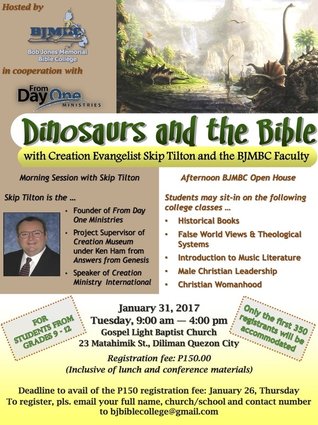
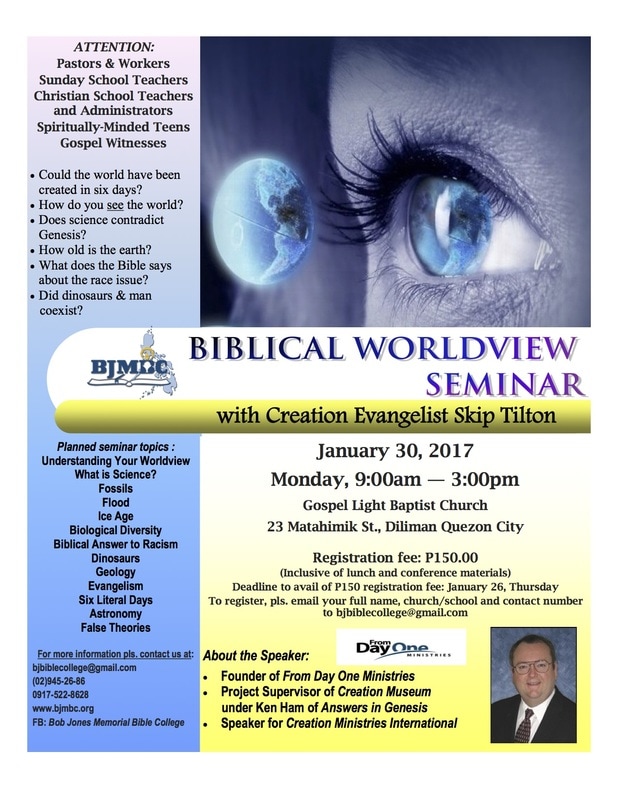



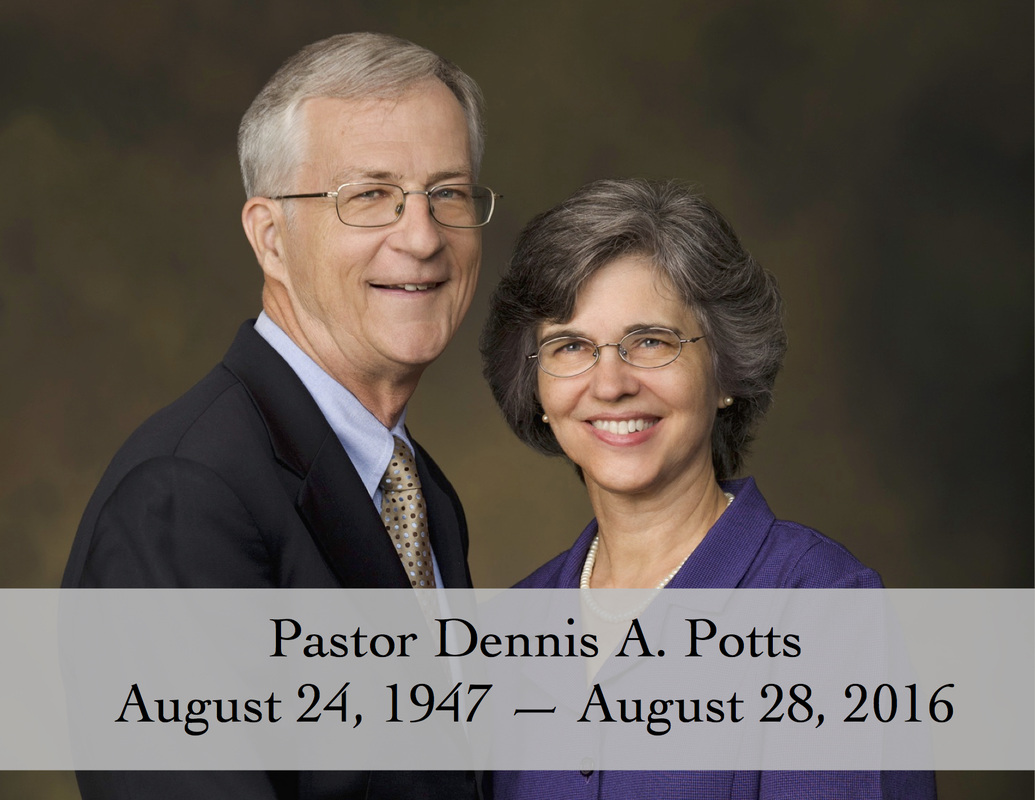



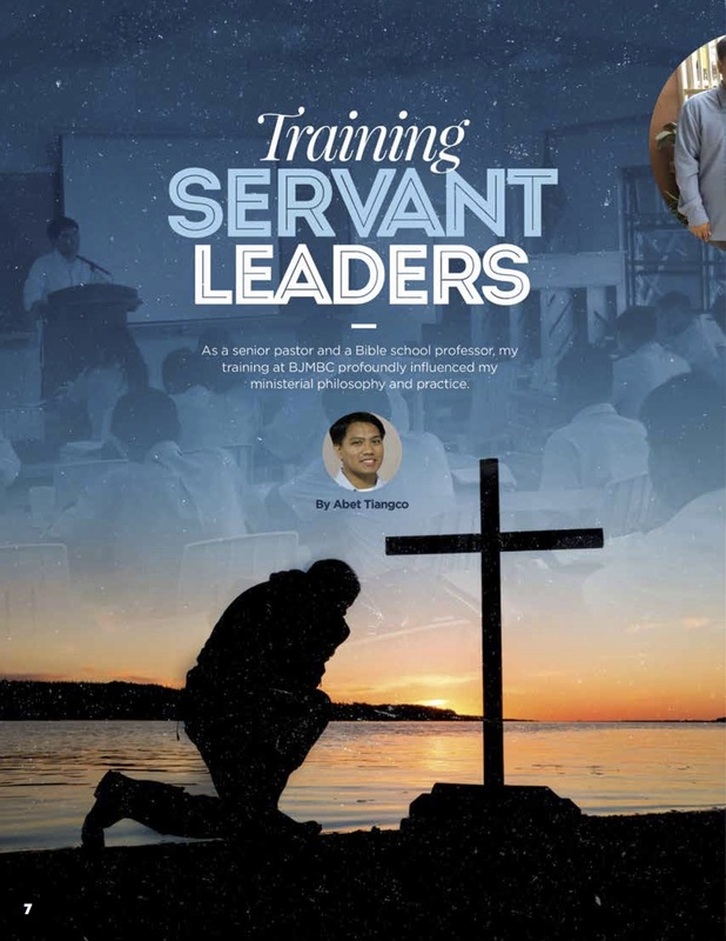
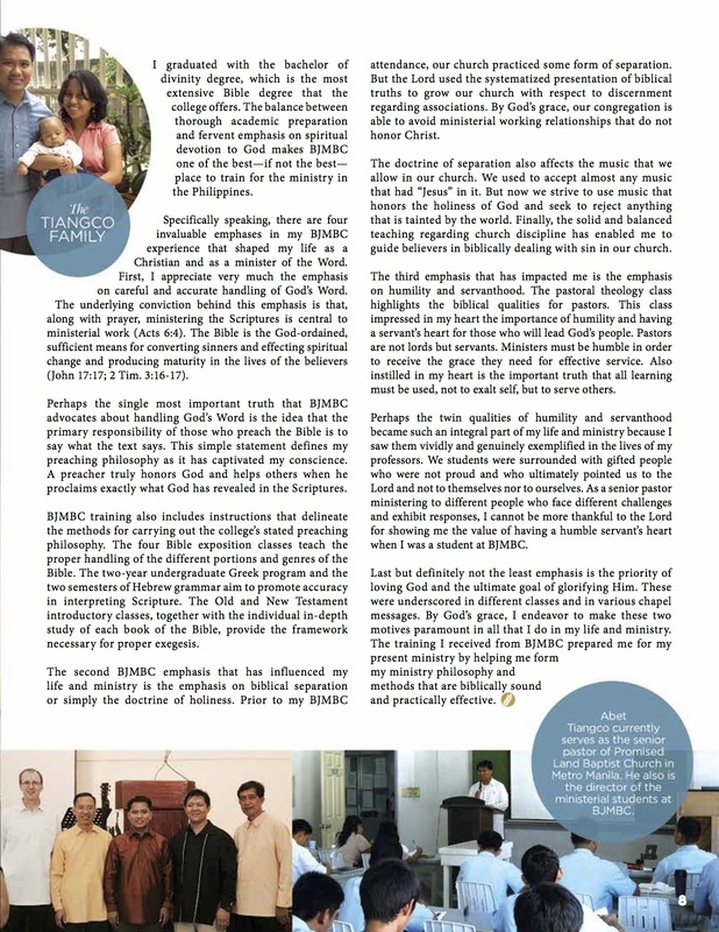

 RSS Feed
RSS Feed